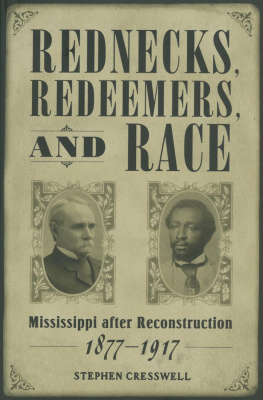REDNECKS, REDEEMERS, AND RACE | Mississippi after Reconstruction, 18771917 |
BOARD OF EDITORS
HERITAGE OF MISSISSIPPI SERIES
William F. Winter, Chair
Dernoral Davis
H. T. Holmes
Peggy Jeanes
Neil McMillen
John Marszalek
Charles Reagan Wilson
Christine Wilson
HERITAGE OF MISSISSIPPI SERIES
VOLUME III
REDNECKS, REDEEMERS, AND RACE | Mississippi after Reconstruction, 18771917 Stephen Cresswell University Press of Mississippi for the Mississippi Historical Society Jackson |
Publication of this book was made possible through grants from the Mississippi Humanities Council and the Phil Hardin Foundation.
Unless otherwise noted, images contained in this volume are provided courtesy of the Mississippi Department of Archives and History.
www.upress.state.ms.us
The University Press of Mississippi is a member of the Association of American University Presses.
Copyright 2006 by the Mississippi Historical Society
All rights reserved
Manufactured in the United States of America
First Edition 2006
Library of Congress Cataloging-in-Publication Data
Cresswell, Stephen Edward.
Rednecks, redeemers, and race : Mississippi after Reconstruction, 18771917 / by Stephen Cresswell. 1st ed.
p. cm. (Heritage of Mississippi series ; v. 3)
Includes bibliographical references (p.) and index.
ISBN 1-57806-847-9 (cloth : alk. paper) 1. Social changeMississippiHistory 19th century. 2. Social changeMississippiHistory20th century. 3. MississippiPolitics and government18651950. 4. MississippiRace relations. 5. MississippiSocial conditions. 6. MississippiEconomic conditions. I. Title. II. Series.
F341.C74 2006 |
976.2061dc22 | 2005024082 |
British Library Cataloging-in-Publication Data available
To my parents, Ephraim and Catherine Cresswell of Durant, with profound thanks for all of their constant and loving support
CONTENTS
4. The Persistent Institution
Conflict and Racial Separation
ACKNOWLEDGMENTS
I have long felt drawn to write about Mississippis history in the years after Reconstruction. Here was a fascinating period that saw the impressive proliferation of timbering and railroading, the rise of sharecropping, and the beginnings of Jim Crow segregation. During the years 1877 to 1917, Mississippi native Ida B. Wells was writing her hard-hitting newspaper articles, while for the first time people outside of Mississippi heard the music that came to be called the Delta blues. Spending their formative years in Mississippi during this period were artists as diverse as William Faulkner, Jimmie Rodgers, and Richard Wright. I have enjoyed immersing myself in the history of this interesting era and have learned about topics new to me, such as the impressive textile mill at Wesson and the tumultuous strikes by Illinois Central Railroad workers and by shrimp fishermen on the Gulf Coast.
Writing as I have been from West Virginia, I could not have completed this book without the help of innumerable librarians and archivists who shipped books, photocopies, and microfilm to me. They were willing to pull materials ahead of time for my frequent, but always quick, research trips. I especially want to thank the librarians and staff members at Mississippi State University, the University of Mississippi, the University of Southern Mississippi, and the Mississippi Department of Archives and History. Also helpful were staff members in the public libraries of Copiah, Forrest, Harrison, and Lauderdale counties. In hopes of finding sources untapped by earlier historians of Mississippi, I made a research trip to Louisiana State University, where I found close to one hundred important collections of papers of Mississippians of this period. The staff there was very helpful, even going so far as to help me find lodgings. I also wish to thank the staffs at the Library of Congress and at the libraries of the University of North Carolina, the University of Virginia, and West Virginia University.
On the campus of my home institution, West Virginia Wesleyan College, I found nothing but support for this project. The library staff was very patient fielding requests for interlibrary loans and helping me negotiate the intricacies of the information superhighway. President William R. Haden and Dean Larry Parsons help foster a climate on campus where assistance for research is always available. Also supportive were my colleagues in the Department of History and International Studies, including William Mahoney, Robert Rupp, James Beeby, Katharine Lane, and Herb Costen. All of them remind me that much of the value of research for a faculty member is its ability to reinvigorate teachers in the classroom.
I salute the board of editors of the Heritage of Mississippi series. It has been a real pleasure for me to work with the expert readers they recruitedbeginning at the stage of the outline. These readers made numerous suggestions for improvements, which I hope I have used to good effect. Needless to say, any remaining errors of fact or interpretation are mine.
I voice my hearty appreciation to copyeditor Robert Burchfield, who brought many improvements to the manuscript. At the University Press of Mississippi, I was happy to work a second time with director Seetha Srinivasan and editor Anne Stascavage and for the first time with editor-in-chief Craig Gill. All are consummate professionals who worked hard to make the book the best that it could be. I also thank the many staff members who work behind the scenes on book design and marketing.
I want to thank my parents, Eph and Catherine Cresswell, who first instilled in me an interest in history and specifically the history of our native state of Mississippi. The stories they told me of our forebears lives in the state were fascinating, and while conducting the research for this book I stumbled across our kin several times. My parents love and support over the years have been unfailing.
Finally, I thank my wife, Teresa Hamm, surely the most patient woman in the world, on matters related to this book and otherwise. I deeply appreciate the quarter century of unbroken love and support she has given me.
REDNECKS, REDEEMERS, AND RACE | Mississippi after Reconstruction, 18771917 |
CHAPTER ONE
CIVIL WAR, RECONSTRUCTION, AND 1877
At the time of its secession from the Union in 1861, the state of Mississippi in many ways was a raw, frontier region. Although Europeans founded Mississippis first white settlement in 1699, not until the 1830s did American Indian cessions allow settlement in the northern half of the state. White settlers had passed over much of southern Mississippi, moreover, because the regions sandy soil was unsuitable for growing crops. Thus, at the outbreak of the Civil War, many counties in Mississippi had been settled thirty years or less, and other parts of the state were still wilderness. The largest city in the state was Natchez, with a population of about 6,600, while Vicksburg could boast a population of only 4,600. The state capital of Jackson barely topped 3,000 residents, and Meridian was a small, unincorporated village. On the other hand, Mississippi was the key state of the great cotton kingdom. Slaves worked plantations along the Mississippi and Yazoo rivers, their tributaries, and elsewhere, and produced more than one million bales of cotton each year. A majority of the states population was enslaved, and whites were ever vigilant for signs of slave rebellion.1









